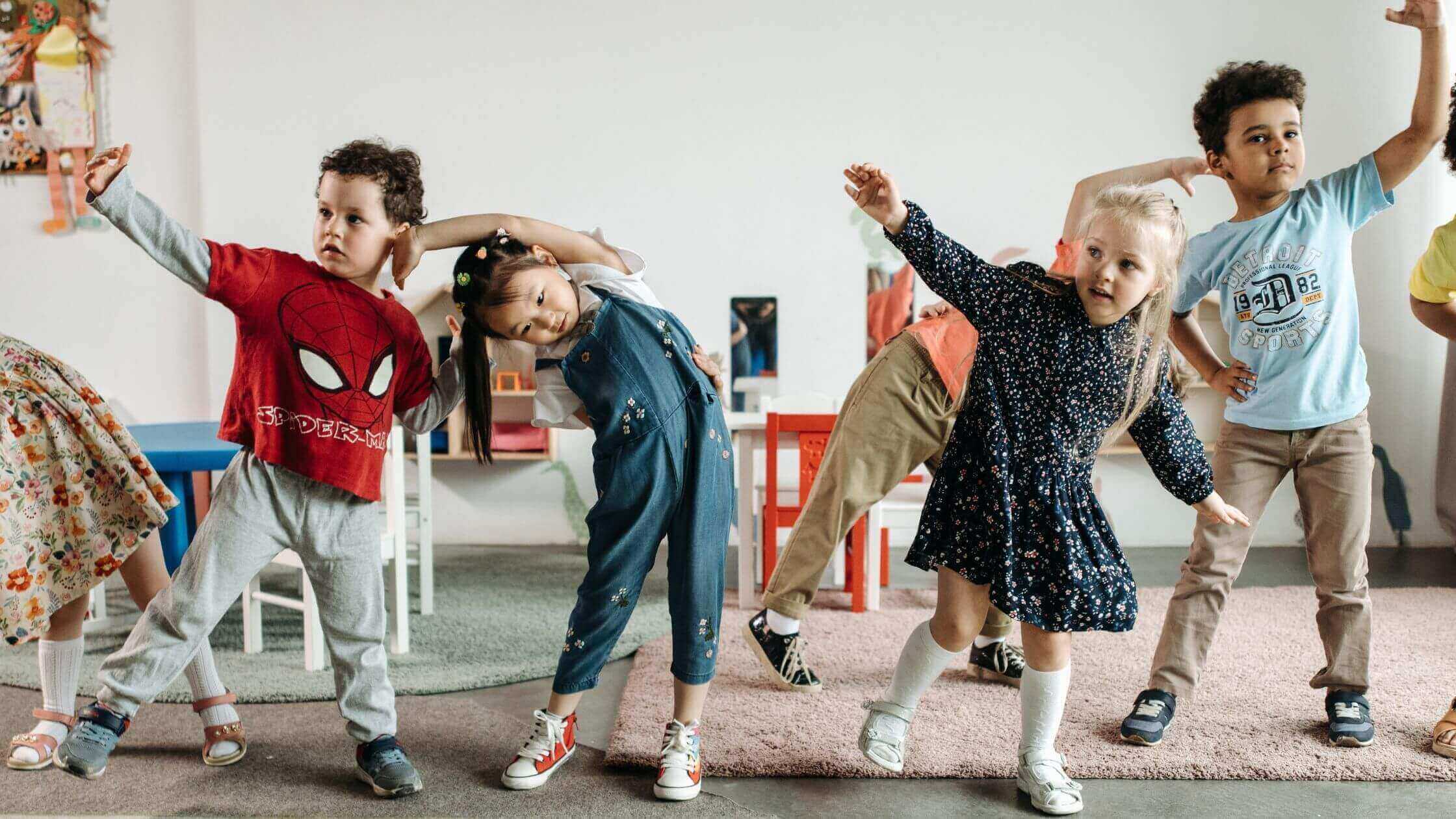Movement is more than just physical exercise; it is a powerful tool for developing social and emotional skills in early years children and promoting well-being among educators. As the Royal Foundation Centre for Early Childhood’s latest Shaping Us Framework highlights, prioritising social and emotional development in the early years is essential for long-term success and happiness. By incorporating movement into early years settings, we can create environments that nurture resilience, emotional regulation and positive relationships.
The Benefits For Early Years Children
From a young age, children use movement to explore their world, express emotions and interact with others. Engaging in physical activities helps them develop essential social and emotional skills, including:
- Emotional regulation: Activities help children manage their emotions. Running, jumping, dancing and stretching can release built-up energy and reduce stress, supporting self-regulation
- Building relationships: Group activities that involve movement, such as cooperative games, dancing and role-play, encourage social interaction, turn-taking and teamwork. These interactions lay the groundwork for essential life skills such as empathy and cooperation
- Confidence and self-esteem: Mastering physical skills gives children a sense of achievement, helping to boost their confidence and willingness to engage with others through play and daily activities
Movement For All: Supporting SEND Children
It is crucial to ensure that opportunities are inclusive and accessible for all children, including those with special educational needs and disabilities (SEND). Movement plays a transformative role in supporting their social, emotional and physical development by:
- Enhancing sensory integration: Activities, particularly those involving rhythm and balance, help children with sensory processing challenges regulate their responses to external stimuli
- Developing motor skills: Adapted physical activities, such as seated games or sensory-friendly dance sessions, support children with motor coordination difficulties
- Improving social engagement: Structured movement-based interactions provide opportunities for children with SEND to engage with peers naturally and enjoyably
- Promoting emotional well-being: Movement helps reduce anxiety, improve mood and provide a sense of calm for children who may struggle with emotional regulation
The Shaping Us Framework emphasises the importance of nurturing skills such as managing emotions and fostering relationships in early years. As the Princess of Wales stated, “If we can develop these skills in the earliest years of life, we can build a society that is healthier, happier and better equipped for the future.”
Why Movement Matters For Educators
The benefits of movement extend beyond children – early years educators also thrive when they incorporate movement into their daily routines. Teaching is a physically and emotionally demanding profession, and regular movement can help:
- Reduce stress and improve mood: Physical activity releases endorphins, which help combat stress and fatigue, making it easier to manage the demands of early years settings. Simple stretching exercises, yoga or even a brisk walk during breaks can have a significant impact on mental well-being
- Enhance engagement and connection: Actively participating in activities fosters stronger connections with children, creating a positive and interactive learning environment. When educators engage alongside children in movement, they build trust, relationships and a sense of fun that enhances the learning experience
- Improve physical health: Simple activities like stretching, walking, and dancing help educators stay active and avoid common issues like back pain or stiffness. Maintaining mobility and flexibility ensures educators can keep up with the physical demands of working with young children
International Day Of Dance
A fantastic way to introduce movement into early years settings is by celebrating International Dance Day on 29th April. Dance is a universal form of movement that supports social-emotional learning, coordination and creative expression. Educators can use this day as a provocation to inspire movement-based activities such as:
- Cultural dance exploration: Introduce children to traditional dances from around the world to promote cultural awareness and appreciation
- Expressive sessions: Encourage children to express emotions through movement, using music as a guide for storytelling and emotional exploration
- Group dance challenges: Create fun, cooperative dance routines that build teamwork and foster a sense of community among children and educators
- Mindful movement: Integrate gentle stretching and slow activities to help children learn self-regulation and relaxation techniques
By incorporating International Dance Day into early years settings, educators can highlight the joy and benefits of movement in a fun, engaging way for all children.
Making Movement A Priority In Early Years Settings
Integrating movement into daily routines does not have to be complicated. Here are some simple ways to encourage it in early years settings:
- Role-play and interactive storytelling: Use imaginative play that involves movement to engage children and reinforce key learning concepts. Acting out stories and engaging in pretend play allow children to develop communication and emotional expression skills while being physically active
- Dance and music activities: Encourage self-expression by incorporating music and rhythm into the day. Singing action songs or playing instruments while moving helps to enhance cognitive development and coordination
- Outdoor exploration: Utilise outdoor spaces for running, climbing and playing, allowing children to experience the benefits of nature. Time outside can help improve mood, focus and social skills while providing vital opportunities to increase the amount of their daily exercise
- Guided movement breaks: Introduce activities throughout the day that align with children’s natural rhythms. These could include stretching sessions, interactive games or playful physical activities that support self-regulation while allowing children to remain engaged and focused on their interests
By prioritising movement, we can support the holistic development of children and educators alike. As research and experts continue to highlight, fostering social and emotional well-being in early childhood lays the foundation for a happier, healthier society.
Movement isn’t just about physical health – it’s a key element in building emotional resilience, fostering relationships and creating joyful learning environments.

